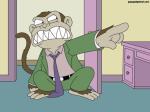Brokeback Blogging

Last night, Mrs. Evil Monkey and I took advantage of some free passes to an advance screening of Brokeback Mountain, otherwise known as the "gay cowboy movie".
Click below for the rest...
As it turns out, the first 20 minutes of Brokeback Mountain live up to this monniker. Two teenage ranch hands (Jake Gyllenhaal as Jack Twist, Heath Ledger as Ennis Del Mar) find summer work herding sheep all alone in Wyoming, circa 1962. After a few months of caring for the sheep, eating prodigious quantities of canned beans, and getting hammered on cheap whiskey, Ennis also hammers a rather willing Jack in a stark depiction of forbidden teenage man-on-man lust. Afterwards, when Ennis reminds us "..it don't make me no queer", Jack agrees.
Watching the film, it is almost as if director Ang Lee realized that this picture could not escape the gay-cowboy stereotype, and decided to utilize the yield-redirect-control principles of kung fu for which he is more widely known (having acquired much of his directing fame from Flying People, Hidden Wires moreso than Eat, Drink, Man, Woman and his other dramatic films) so as to keep Brokeback from suffering the same "homo-ass-candy-flick" stereotypy as Troy. With the colonoscopy now out of the way, we quickly find that Jack and Ennis are as uncomfortable with their "collision" as the audience, which will set the tone for the rest of the picture.
The rest of the movie details the following twenty five or so years, as Ennis and Jack try to inculcate themselves into rural Wyoming and Texas life, respectively, and establish some semblance of normalcy. They meet women, they marry, they have kids. From here, the movie tends to focus more on Ennis. Far from being a "gay cowboy movie", Brokeback Mountain is also a film about the hardships of a rancher raising a family in a region where money is scarce and the landscape is simultaneously as barren, harsh, and beautiful as an Andrew Wyeth painting. Rent money is hard to come by for a newly married Ennis (whose wife is played by former Dawson's Creek star Michelle Williams), and his family takes up residence in a dingy apartment above a laundromat after trying to make ends meet in an ancient farmhouse shanty. Both parents work, and try to balance their respective demanding low-wage jobs while juggling the kids back and forth. Jack's life is financially much more stable, but his relationship with his wife and her family are similarly unfulfilling.
Ennis and Jack also try to cope with their feelings for each other, going away for long weekends together a couple times per year, often at the monetary and/or emotional expense of their respective families. Their meetings cause problems for each other as well, since neither is comfortable with the all-too-infrequent liasons and knowledge that the other has no place in their "real" lives. And suffer they do, every one of them, which is unfortunate; nobody in this movie can by any stretch of the imagination be characterized as a "bad" person (except perhaps Jack's father-in-law, who gets put in his place during a very satisfying holiday dinner, to the audience's applause).
This film is superbly acted, expertly directed, and a cinematographic masterpiece. There is little dialogue, a la Lost in Translation, and the formula works well here. Heath Ledger outdoes himself, nailing the demeanor and regional dialect of a Wyoming rancher with shocking ease. You completely forget his cornier roles like 10 Things I Hate About You and A Knight's Tale.
The genius of Brokeback is that everyone can relate to some facet of this film, and not because we are ostentatiously beaten about the head with any particular message. There is no earth-rending scene that rips the tears en masse from the audience, although there are copious amounts of sniffles. Romeo and Juliet do not lovingly slay themselves to great fanfare. Rather, Brokeback wears upon the audience much as it wears down the characters; for us, there's precious little energy left to grieve by the end of the film. For them, time passes gradually, day by day, minute my minute, until there is nothing left but the shells of formerly vibrant human beings. People come and go. But Ennis's and Jack's demons never leave because they never let them. The lesson, if there is one, is that we create our own hell by failing to cast off our suffering and just live. Ultimately, Brokeback Mountain is a movie about two ordinary people who make bad decisions, and subsequently hurt themselves in an attempt to minimize the pain they cause others.
They just happen to be gay.
Go see this film.


4 Comments:
Eh... still looks like a boreing movie.
Did you at least get laid afterwards ?
By Anonymous, at 12/11/2005 01:53:00 PM
Anonymous, at 12/11/2005 01:53:00 PM
"Homo On the Range"...but is this really so interesting? [ie their "different" sexuality?]
I will see it, of course, if only to determine whether it constitutes another "splash" in Nouvelle Fague Cinema.
VL
By vergelimbo, at 12/14/2005 11:09:00 PM
vergelimbo, at 12/14/2005 11:09:00 PM
It isn't about homosexuality, really. It is a love story. It is told through the visual media; their body language is the dialogue.
By Evil Monkey, at 12/15/2005 07:49:00 PM
Evil Monkey, at 12/15/2005 07:49:00 PM
Incidentally, there are more straight sex scenes than gay sex scenes in the movie. Sex isn't the driving force of the movie, it is depicted as something people in relationships do. Which is why if it had been Maggie Gyllenhaal, the religious right wouldn't have given a crap.
By Evil Monkey, at 12/15/2005 08:55:00 PM
Evil Monkey, at 12/15/2005 08:55:00 PM
Post a Comment
<< Home